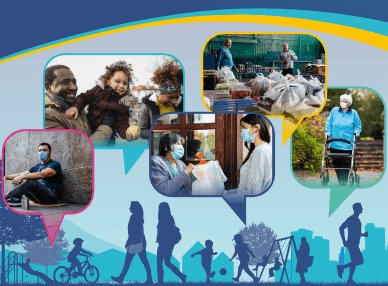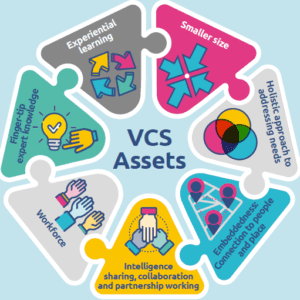Emerging Drivers of Vulnerability to Health Inequity in the Context of COVID-19: Perspectives and response from the Voluntary and Community Sector in Wales
A new report, funded by Public Health Wales, highlights how vulnerability emerged in Wales during the Coronavirus pandemic, and how the voluntary and community sector (VCS) has played a critical role in tackling this challenge thanks to their agility, knowledge, and commitment. The report shows what works for the VCS, and how public health practitioners and policy makers can harness their value in future crises.
by Daniel Jones, Alice Willatt, Richard Kyle, Alisha Davies
The pandemic and emerging vulnerability
The COVID-19 pandemic has revealed that we can all be subject to the effects, 
Research on the role and pandemic responses of the VCS
Charities are an invaluable source of information about people’s needs (collectively known as the VCS). They respond to and support people across Wales and other countries on a daily basis. With our Public Health Wales qualitative research project, our aim was to explore how the VCS identified and responded to emerging vulnerability during the COVID-19 pandemic so that we could learn lessons for the future.
VCS representatives across Wales took part, sharing their experiences in identifying and responding to those most in need during the pandemic. The work highlighted that vulnerability was quick to emerge and escalate when individuals were unable to access support from particular resources, services, and local infrastructure.
We found that key needs clustered, and often followed pre-existing lines of social inequality. They included:
- Worsening mental health due to anxiety and loneliness
- Economic insecurity due to strained household finances and job loss
- Digital exclusion
- And loss of many face-to-face services
The assests of the VCS, and the challenges they face
The research also revealed how the VCS has been pivotal in helping to tackle isolation and loneliness, address the consequences of digital exclusion, and broker access to statutory services.
Our discussions revealed seven core assets held by VCS organisations. These assets enabled them to respond to emerging vulnerability in a rapid and effective way. These are:
- Knowledge and expertise held by staff and volunteers enabling rapid decision-making.
- Small size and lack of hierarchy enabling swift innovation
- A holistic approach to understanding a person’s needs
- Being embedded in local communities and connected to local networks
- Collaborating and sharing information with other organisations and groups
- Volunteers and employees care, commitment, and compassion
- Learning from accumulated experience
Interviewees also reflected on specific challenges faced by the VCS during the pandemic. These included:
- lack of secure funding
- the impact of digital exclusion on service coverage
- the impacts of the pandemic on the wellbeing of the VCS workforce itself.
This was alongside some opportunities, including the time and cost savings from digital working, increased collaboration with statutory services, and greater public recognition of the VCS as a whole.
Lessons for public health
Our report concludes with several messages for public health policymakers and researchers based in public health:
- The importance of early identification and prevention in addressing vulnerabilities and health inequalities
- The importance of recognising, valuing, and sustaining the unique assets offered by the VCS
- The importance of health and social care bodies developing a co-ordinated approach that harnesses the VCS
- The need to continue to strengthen and develop institutional infrastructure for partnership working
- The value of qualitative public health research and person-centred, holistic approaches to vulnerability in future work. Future research and policymaking would benefit from incorporating this understanding of emerging vulnerability. This should complement more traditional and clinical perspectives that have been used to identify people as vulnerable
Our report was shared with colleagues across the VCS and the Welsh Government to shape the on-going response to the pandemic and inform future policy. Dr Sally Rees, National Third Sector Health and Social Care Manager at the Wales Council for Voluntary Action summarised:
“The findings from this research highlights the important role the VCS has played, from the outset, in supporting vulnerable people in our communities during COVID-19. As this research identifies, there is a need for a co-ordinated approach that values, understands and acknowledges the role the sector in the co-design and co-delivery with citizens of sustainable, well-resourced voluntary and community-based services now, and in the future to reduce the prevalent health inequalities across Wales.”
You can read the report here. For more information about the work please contact [email protected]







